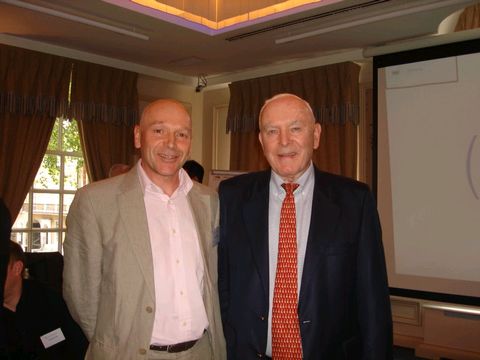
Professor Robert Hogan Illuminating the Dark Side of Personality at the Psychometrics Forum, London, 25th September 2014
OCT
09th
Posted by: David Woollard
Professor Robert Hogan, author of the well-known assessment of the dark-side of personality the Hogan Development Survey (HDS), recently delivered a session entitled "Illuminating the Dark-Side", to the Psychometrics Forum in London. This was something that I decided I did not want to miss, so off I went to the very grand surroundings of the Caledonian Club, near Hyde Park in London! I had a couple of objectives for the day, namely to enrich my knowledge of dark-side issues and to get a selfie with Robert. As it turned out, I achieved the first, but had to settle for a traditional photograph taken by Xanthy Kallis, Chair of the Psychometrics Forum:

Me on the left, Prof Hogan on the right!
The session included a number of interesting observations, such as "some dark-side is essential for success". Here, Robert mentioned his "Apple Paradox", i.e. how do unpleasant people become successful leaders, citing the example of Steve Jobs. The essence of the answer is that they have to be very good at what they do, and that followers and other stakeholders will tolerate this unpleasantness, as long as the success continues.
Robert also mentioned what he considered to be the omnipotent principles of leadership, namely:
- Act with integrity.
- Know what you're talking about.
- Make good decisions.
- Have a vision for the future.
The point about decision-making was further elaborated, with Robert stating that as lots of decisons that are made turn out to be wrong or poor, developing good decision-making skills and judgment is all about review and reflection. He quoted Will Rogers as having said "good judgment comes from experience and a lot of that comes from bad judgment". Thus, decison-making skill and the potential to develop in this domain is therefore closely linked to personality, which is an area Hogan has been reseraching recently. He has created the "Hogan Decision Style Model", which can now be accessed via a report derived from the HDS. It looks at information processing, pre-decision tendencies or biases and reactions to poor decisions. This lead on to some discussion about some typical responses to how people typically respond less construcively to feedback, i.e.:
- Defensive.
- Denial.
- Superficial engagement.
All this lead on to the concept of "coachability", and the observation that some people are more coachable than others, based of their personality characteristics which may pre-dispose them to be more or less open to feedback. Of course, having insight into how coachable someone might be, before engaging with them in a coaching capacity, might be quite useful!
A lot of food for thought, as one might expect from one of the pre-eminent occupational psychologists of our era. Similarly, Andrew Munro did a great session in the afternoon, so all-in-all, I had a very good day. As usual, I didn't need to too much persuading to say what I thought about it all, so Raj Chopra didn't have to work too hard to get me to do a small piece to camera - and all this for £65 for the day!


